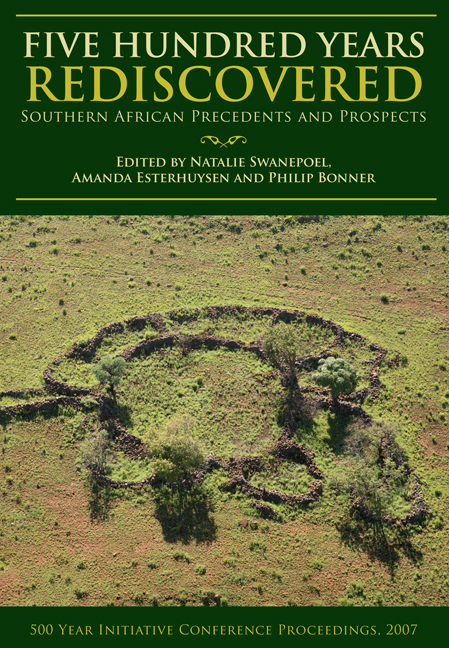1 - Introduction
Published online by Cambridge University Press: 30 May 2019
Summary
Highlighting the period and the term 500 years may create in the minds of older scholars curious resonances and dissonances. Five Hundred Years was the title of a volume published by C.F.J. Muller of the University of South Africa in 1969. There it referred to the length of time claimed for white involvement in South Africa. The book had an entirely white frame of reference, and made next to no reference to an independent history of blacks (who mostly were brought under white domination 180-130 years before and whose past was relegated, in almost an afterthought, to an appendix) (Saunders 1988: 43). In 2006 a group of archaeologists and historians, young and old alike, centred mainly but not exclusively in the Gauteng region, became involved in what they called the Five Hundred Year Initiative. Their aim was to invert the old 500 years mindset and to make up for several decades of neglect of certain aspects of our historical and archaeological past. The most profitable route to achieving this goal they saw as interdisciplinary research which generated close collaborations between archaeologists, oral historians, social anthropologists, linguists and others. As their initial manifestos/grant proposals claimed, the last 500 years was a time of immense change, enterprise, and internal invention amongst African societies caught up in an internal African frontier which was subsequently, secondarily but nevertheless vitally impacted upon by a final ‘white frontier’. This involves at least partly a clearer awareness of what we have overcome, and upon which we can build, that is to say, the shortcomings, myopias, and the strengths of research and writing that has taken place mainly within the constricted confines of individual disciplines over the past decades. Since the principal academic domains which this preliminary volume straddles are archaeology and history, it is with a brief review of the pertinent past of each that this introduction begins.
History
South African precolonial history and archaeology have followed curiously similar paths. Until the 1940s most research on African societies in the precolonial and early contact period was conducted by amateurs, generally government servants involved in native affairs, or missionaries.
Information
- Type
- Chapter
- Information
- Five Hundred Years RediscoveredSouthern African precedents and prospects, pp. 1 - 20Publisher: Wits University PressPrint publication year: 2008
